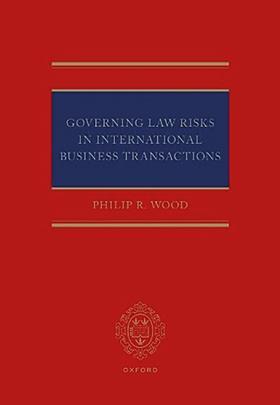Justice, morality and choice of jurisdiction
Governing Law Risks in International Business Transactions
Philip R Wood
£125, Oxford University Press
★★★★★
My professional experience of governing law clauses in contracts tends to fall into three distinct categories. First, when dealing with the sale of a company incorporated in Northern Ireland, we usually insist that NI law should apply to the sale agreement if the buyer is based in England or Ireland; the buyer will often prefer to use the law of its home state. Second, when a client sends us a contract to review because of a potential dispute, we turn first to identify the governing law clause; if it is not NI law, we may need to refer the client to another law firm in the relevant jurisdiction. Third, if our client is entering into a contract governed by, say, English law, we may be asked to provide a Northern Irish legal opinion to the counterparty on matters of ‘authority and enforceability’.

There are 320 jurisdictions in the world. Parties to a contract could, in theory, choose any one of these 320 to govern their contract. Why do parties choose a particular governing law for a transaction? In addition to an assessment of risk, Philip Wood asserts that the choice of law expresses the parties’ beliefs about the rules of justice and morality. This fascinating book is, according to its author, ‘about the advantages and the risks involved in the choice of law governing an international contract or other transaction, plus the accompanying choice of courts, in the fields of wholesale (non-consumer) financial, corporate, commercial, and insolvency law – broadly business law – on a comparative basis’.
The legal systems of England and New York are widely used, often by parties who have no connection or links with England or New York. The fact that the use of these systems is so widespread means that the respective legal systems no longer belong just to England or New York. The law-makers and courts in those territories also look after their legal system for the rest of the world. The author considers whether these jurisdictions have an obligation to ensure the preferred norms of the international business community are taken into account in law-making. This can result in laws which are made on the basis of ‘a sunny belief in economic progress and liberty’ or, from another viewpoint, directed by the invisible and not necessarily benevolent hand of the free market.
The fact that England was the first large economy to experience the industrial revolution, and the associated increase in the generation of wealth, is one of the reasons why English law assumed its position as the preferred, or even default, choice of governing law for international contracts. The value of a governing law can be enormous. English law underpins trillions of dollars of annual business activity. It is, according to Philip Wood, a national asset which requires effort and discipline to maintain and protect.
Political events, including a statement by a government minister that proposed legislation will ‘break international law in a very specific and limited way’, could undermine the economic value of English law in international commerce. Wood advocates the establishment of a body, the ‘Institute of English Law’, to protect and maintain the English legal system.
Kevin McVeigh is a partner at Elliott Duffy Garrett Solicitors, Belfast
Philip Wood KC CBE is a long-time friend of the Gazette. For many years he was a partner at Allen & Overy, where he led the firm’s banking department and subsequently its Global Law Intelligence Unit. The Gazette has one copy of his book to give away to a lucky reader: simply email editor paul.rogerson@lawsociety.org.uk to enter a free draw.































No comments yet